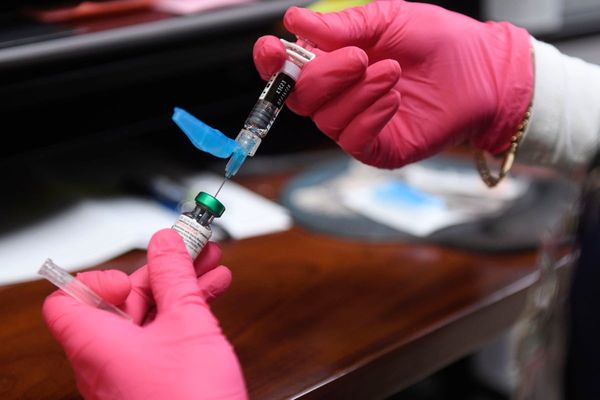
It’s the UK equivalent of bullfighting. Next week, in Falmouth in Cornwall, anglers will compete to fish for bluefin tuna in a three-day tournament. Sponsored by companies including Suzuki and Shimano, it’s a festival of cruelty and destruction, waging war on a magnificent giant which, in a rare instance of ecological hope, has begun returning to our shores.
Where’s the sport in this “sportfishing”? While some forms of angling require knowledge and skill, in this case the paying customer (the angler) sits in a boat while the professional skipper motors up and down, trailing a set of lures. When a tuna is hooked, the angler, strapped into a harness, either stands or sits in what is called the “fighting chair” and “plays” the fish to exhaustion: a one-sided fight of 30 minutes or more. It’s a risk-free means of pitting yourself against nature, a truly pathetic form of macho gratification. You can imagine my surprise on discovering that Nigel Farage is a big fan.
Among the plastic warriors looking for an IRL game they can play from a chair, recreational tuna fishing is booming. While in 2024, 93 licences were granted to charter boats and private boats catering for the market, this year the government has issued as many as 180. Obviously, the decision is backed by the best possible science, informed by knowledge of populations and of what happens to the fish after they are released …
Sorry – went off on one there. Obviously not. The government tells me “there are no estimates of the number of bluefin tuna in UK waters”. There is also a dearth of studies on what happens to tuna once they have been caught and released, and none assessing the impacts of real-world tuna angling in the UK. The best we have is an Australian study of real angling conditions, which reports a bluefin survival rate of 83%: in other words, 17% die. The marine ecologist Dr Richard Kirby says mortality in real conditions “is likely to be higher than that seen when bluefin tuna are caught under scientific conditions where the post-release survival of the animal is crucial to the research”.
Alongside a study conducted in circumstances far removed from the macho feeding frenzy we see in the videos posted by anglers and charter companies, the UK government relies on skippers reporting fish that die beside the boat. There’s an obvious incentive to undercount. But rest assured: a paper for the government tells us “charter vessel interviewees reported no issues with their own reporting”.
The great majority of deaths are likely to occur after release. Bluefin tuna are partially warm-blooded fish that overheat when forced into sustained flight. After a certain time on the hook, oxygen loss kills their muscle cells. They need to cool down as rapidly as possible once released, by diving deep, where the water is colder.
This is why the partnership set up by the government, Thunnus UK, states that “care should be taken not to release tuna in water shallower than 50m”. But the code of conduct agreed between the government and the recreational fishing lobby, the Angling Trust, specifies just 40 metres. Could this be because few of the inshore locations where tuna are caught in the UK are 50 metres deep? Even 50 might be too shallow: a study off Ireland found tuna immediately diving up to 80 metres after release.
Skippers routinely break even this feeble code. I have watched recreational tuna boats fishing in the midst of great shoals of tuna within 100 metres of the shore, where the water is just 15 metres deep.
The Falmouth tournament organisers claim that “the welfare of the fish is of paramount importance”. If so, that will be a radical break from common tuna-angling practice. On Facebook and Instagram, you can watch videos of men going mad on testosterone once they hook a fish, while the code of conduct walks the plank. Charter companies boast of two or even three anglers playing fish at once, though the code says “multiple hook-ups have been shown to risk an increase in mortality … Upon hook-up immediately remove other tackle from the water.” As one boat owner remarks, while bragging about a triple hook-up, “the carnage continues”. I have seen videos in which two-hooked lures are used: the code says they should not be deployed “under any circumstances”. Anglers should “keep fight time to a minimum”, as an hour or more “may compromise” survival rates. Yet we see them crowing about playing fish for 90 minutes. The code says “conventional gaffs [long hooks used to pierce the fish and hold it alongside the boat] should not be used”, but this is also ignored.
On a podcast a few months ago, a charter boat skipper states: “I’ve seen loads of release shots on social media this year with fish going back.” His reaction? “They’re fucked.” Fishing News reports that for the first time last year, trawlers started pulling up “dead bluefin, some in an advanced state of decomposition … It is highly likely that this is linked to the expansion of the charter angling fishery in 2024.”
Until recently, I thought the recreational fishery might become a lobby for the tuna’s protection against commercial fishing. What we see instead is a Klondike rush to profit from the male-inadequacy market. The renowned Cornish fisher Andrew Pascoe, who supports recreational angling in principle, says he has noticed some charter boats have started competing over who can catch the most in a day. “That for me was the beginning of the end … you can’t possibly revive the fish properly and catch 18 fish in a day.” Private boats (ie, those not for hire), he says, are the biggest problem. Some have no idea how to handle the fish, which break free, trailing lures, lines and spreader bars: a death sentence.
A different industry could be developed, employing local people and generating income: tuna watching. It could be a massive attraction for tourists, photographers and wildlife enthusiasts. I have stood many times at a point on the coast where these vast fish leap from the water, catching garfish, sometimes in mid-air. It’s one of the greatest and most reliable natural spectacles on Earth. Who would not wish to be taken out on a boat to watch this marvel at close hand?
I believe that all megafauna, bluefin tuna included, should be treated like whales and dolphins: as animals we no longer hunt or kill. Given that tuna fishing here is still in its infancy, which means the political costs of stopping it remain small, we could create a sanctuary in UK waters for a marvellous species pursued everywhere else. Could we, just for once, get something right?
George Monbiot is a Guardian columnist
The Guardian’s climate assembly with George Monbiot and special guests On 16 September, join George Monbiot, Mikaela Loach and Emma Pinchbeck as they discuss the forces driving the big climate pushback, with an address by Feargal Sharkey







